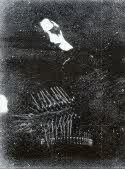 I
IMirrors are the source and origin of the depressive, grey-toned world of Black Metal band Xasthur. In an interview with Malefic (the nom de plume of Scott Conner, Xasthur's monomanic master mind) he suggests that the mirror's reflection played a role even in the genesis of the band:
"Q: Where were you when you first thought the project had longterm potential for you?
A: In my house, as usual...looking out my window and there was nothing there. When I was finishing a song and it actually disturbed me, that was like looking into a mirror and not liking what I saw.... When it reflected a nightmare, I thought it had some potential...but for what?"
So what is the significance of the mirror? In a short series of posts, of which this is the first, I'll examine some of the lyrics to Malefic's music to find out.
II
"Abysmal depths are flooded
For I dug a mass grave in abysmal depths / For this wasted human race shall never be reborn again / Cold burial, their blood stains the snow / Eyes that will never see the same again, after I've shattered your mirrors forever / I will not be kind in the torture you desire / Walking through genocidal remnants / With a hate filled heart / Stabbing even at the tears of withering corpses / Will there even be a word known as death anymore, / When left is nothing to kill?"
 This song - so strange, to use the word 'song' in reference to Xasthur - is from the 2004 album 'Telepathic With The Deceased'.
This song - so strange, to use the word 'song' in reference to Xasthur - is from the 2004 album 'Telepathic With The Deceased'.The narrator of the song has shattered mirrors - your mirrors - the adressee is the listener. The meaning of these shattered mirrors remains unclear; of what are they the metaphor?
The consequence of the shattering of the listener's mirrors is that eyes - whose eyes are they? - will never see the same. At first reading, I thought that the change in eyes meant death - eyes never seeing again - but when mirrors are shattered, they do not stop reflecting. Reading again, I noticed that the eyes never see the same again. The change is not the end of perception, not even a change in the percept; it is a transformation of visual perception itself. The shattering of mirrors results in a transformation of visual perception.
And this transformation of perception is infused with meaning by the use of a rhetorical figure based on disjunctive repetition. The line about visual perception changing when your mirrors are smashed, is answered with a line which is similarly structured: "Will there even be a word known as death anymore / When left is nothing to kill?".
This rhetorical figure suggests a continuity between two situations: the situation when left is nothing to kill and the situation when I've shattered your mirrors forever. In both situations the history of the object in question has ended, in that both situations are complete, irrevocable, permanent (shattered forever/nothing left to kill, shall never be reborn).
That there is a continuity between these two situations, suggests there is also a continuity between the (almost Baudrillardian) metastasis of semantic meaning ("Will there even be a word known as death anymore?") and the transformation of sense perception.
Thus, the lyrics of "Abysmal Depths Are Flooded" can be read as an exercise in a phenomenology of perception, along the lines of the work of Merleau-Ponty: the contemplation of genocide affects the being-in-the-world of the narrator.
Post scriptum
Here is a link to a Xasthur interview at the Sadness Is Delicious blog.




No comments:
Post a Comment